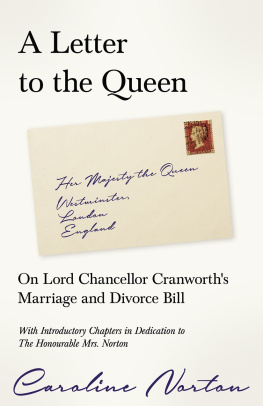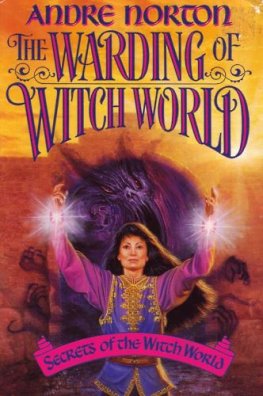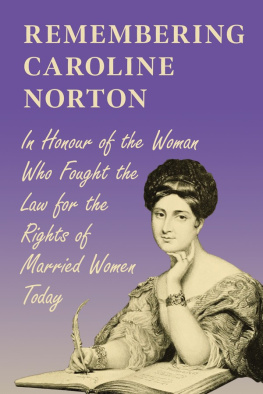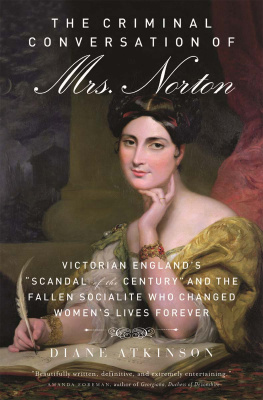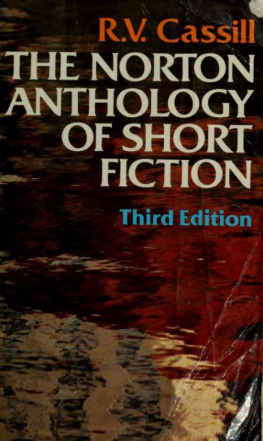CAROLINE
ELIZABETH SARAH NORTON
By Richard Garnett
Poetess, was born in London in 1808, and was the second daughter of Thomas Sheridan and granddaughter of Richard Brinsley Sheridan. Her mother, Caroline Henrietta, daughter of Colonel Callander, afterwards Sir James Campbell (17451832), was a highly gifted and very beautiful woman, and author of Carwell and other novels. The father having died in the public service at the Cape of Good Hope in 1817, the widow found herself in somewhat straitened circumstances, which were, however, mitigated by the king giving her apartments in Hampton Court Palace, whence she subsequently removed to Great George Street, Westminster.
Caroline and her two sisters were distinguished for extraordinary beauty, and in at least two instances for remarkable intellectual gifts. You see, said Helen, the eldest, afterwards Lady Dufferin, to Disraeli, Georgy's the beauty, and Carry's the wit, and I ought to be the good one, but I am not; which modest disclaimer, however, was far from expressi ng the fact.
During the lifetime of her sisters Caroline filled much the most conspicuous position in the public eye. After numerous slight productions, published and unpublished, of which The Dandies' Rout, written at the age of thirteen, seems to have been the most remarkable, she definitely entered upon a literary career in 1829 with The Sorrows of Rosalie: a Tale, with other Poems. This little volume, enthusiastically praised by the Ettrick Shepherd in the Noctes Ambrosian, obtained considerable success, and is typical of all that the author subsequently produced, except that the imitation of Byron is more evident than in the works of her maturity. It has all Byron's literary merits, pathos, passion, eloquence, sonorous versification, and only wants what Byron's verse did not want, the nameless something which makes poetry. The first expenses of my son's life, she says, were defrayed from that first creation of my brain; and the celebrity it obtained made her a popular writer for, and editor of, the literary annuals of the day, which lived by a class of literature to which her powers were exactly adapted. It is stated by herself that she earned no less than 1,400l. in a single year by such contributions. Some of the most characteristic were collected and published at Boston as early as 1833; they are in general Byronic, but include two, Joe Steel and The Faded Beauty, full of an arch Irish humour, which prove the versatility of her gifts, and indicate what she might have accomplished in quite a diff erent field.
Two years before her appearance as an author she had married, 30 June 1827, the Hon. George Chapple Norton, brother of Fletcher Norton, third lord Grantley, a barrister-at-law, who was just completing his twenty-seventh year. According to his own statement, Norton had been passionately in love with her for several years previously; while, according to hers, he had not exchanged six sentences with her before proposing for her by letter. If the marriage was indeed one of affection on either side, it speedily assumed a very different character; and there seems no doubt that, apart from the husband's coarse nature and violent temper, the causes which gradually converted indifference into hatred were mainly of a pecun iary nature.
Norton held only a small legal appointment, a commissionership of bankruptcy, which, according to his wife, he had obtained through the interest of her mother; and, as he does not appear to have had any considerable independent means or professional practice, there seems no reason to question her statement that the family was mainly supported by her pen. Nor is there any difficulty in believing that the husband, pressed by pecuniary embarrassment, urged his wife to exert her influence with her political friends on his behalf; nor, indeed, is it credible that Lord Melbourne, then home secretary, would have bestowed (April 1831) a metropolitan police magistracy upon Norton without very strong inducement from some quarter: Melbourne being thought to be a man of easy morals, and Norton being notoriously unsuited to his brilliant wife, a very delicate situation was created. Miserable domestic jars, of which, it is just to remember, we have only Mrs. Norton's account, followed in the Norton household, and terminated in an open rupture between husband and wife and a crim. con. action against Lord Melbourne. The trial took place on 23 June 1836, and resulted in the triumphant acquittal of the accused parties, who were not called upon for their defence. Sir William Follett, the plaintiff's advocate, was careful to make it known that he had not advised proceedings; and in fact the evidence adduced, being that of servants discarded by Norton himself, and relating to alleged transactions of long previous date, was evidently worth nothing. Some notes of Lord Melbourne, to which it was sought to affix a sinister meaning, gave Dickens hints for Bardell v. Pickwick. The one point which will never be cleared up is whether the action thus weakly supported was bona fide, or was undertaken at the instance of some of the less reputable members of the opposition in the hope of disabling Melbourne from holding the premiership under the expected female sovereign. Mrs. Norton, of course, strongly asserts the latter view, and it certainly was very generally held at the time. The wonder is, says Greville, writing on 27 June, how with such a case Norton's family ventured into court; but (although it is stoutly denied) there can be no doubt that old Wynford was at the bottom of it all, and persuaded Lord Grantley to urge it on for mere political purposes. Lord Wynford, however, formally denied this to Lord Melbourne, and the Duke of Cumberland, who had been accused of having a hand in the matter, made a similar disclaimer.
Mrs. Norton had vindicated her character, but she had not secured peace. Her overtures for a reconciliation with her husband were rejected, and for several years to come her life was passed in painful disputes with him respecting the care of their children and pecuniary affairs. She nevertheless continued to write, contributing much to the periodical press. Her powers continued to mature. The Undying One, a poem on the legend of the Wandering Jew, with other pieces, had already appeared in 1830, and The Dream and other Poems was published in 1840. Both were warmly praised in the Quarterly Review by Henry Nelson Coleridge, who hailed the authoress as the Byron of poetesses.

